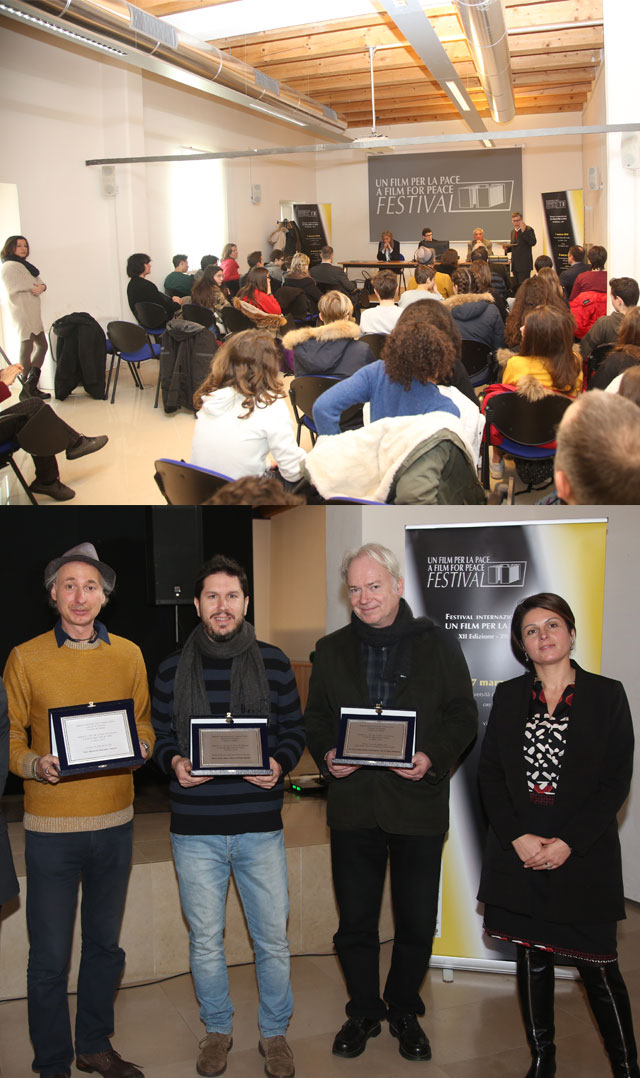
8 March 2018: Awards Ceremony Organized in Two Locations
at the University of Udine, Gorizia Campus (GO)
and at the Civic Hall of the Municipality of Cormons (GO)

The Best Film Awards Ceremony granted by A Film for Peace Festival, 12th edition, took place on the occasion of the International Women’s Day, which celebrates the social, economic, cultural and political achievements of women and also raises awareness of the discrimination and violence to which women have been and are still being subjected in many parts of the world. The Festival wanted to celebrate this day by screening a video dedicated to all women.
During the ceremony, it was also read a message sent to the young people present at the Festival by Aldo Cazzullo. The meeting was moderated by Timothy Dissegna, journalist at the Messaggero Veneto. Among the Faculty members present, we mention Professor Renata Kodilja, Coordinator of the Master’s Degree in Communication Program of the University of Udine, Prof. Paolo Ferrari and Prof. Fulvio Salimbeni, both professors of Contemporary History at the same University. Also present was the President of the Regional Guarantor for the Rights of Persons, Dr. Fabia Mellina Bares, who, after greeting those present, explained the responsibilities of the Guarantor at Friuli Venezia Giulia Regional Council, which involve guaranteeing protection to the children and adolescents, to persons subjected to limitations of personal freedom and to persons at risk of discrimination.
The Festival’s juries granted five Awards and the Artistic Direction six Special Mentions. The City of Cormons’ Special Mention was granted by the Jury representing the Municipality of Cormons (Gorizia).
The Awards were handed out to filmmakers invited by the Festival at the University of Udine, Gorizia Campus, Aula Magna and at the Civic Hall of the Municipality of Cormòns. The Award for Best Anti-War Film, A Film for Peace 2017 was granted to the film “Tides”, Northern Ireland (on the conflict in Northern Ireland) and was handed out to the director Alessandro Negrini by the Mayor of Medea, Igor Godeas.
The Special Award for the Best Film on the First World War was granted to the film “The Fire, a Fowl and an (Un)Forgotten Past”, France (on African colonialism during the Great War) and was handed out to director Jürgen Ellinghaus by Prof. Paolo Ferrari - Lecturer in Contemporary History.
The City of Cormons’ Special Mention was awarded to the film “Senza occhi, mani e bocca”/“(Without Eyes, Hands and Mouth)”, Italy (on violence against children) and was handed out to director Paolo Budassi by Martina Borraccia, Councillor for Culture.
The ceremony was also attended by students of the primary school of Medea and of the secondary school of Ragogna.
The Organization of the Festival wishes to thank all those who participated to this Festival with works of great value and to all our partners who made possible its twelfth edition.
October 28, 2016: Awards Ceremony
at the University of Udine, Gorizia Campus
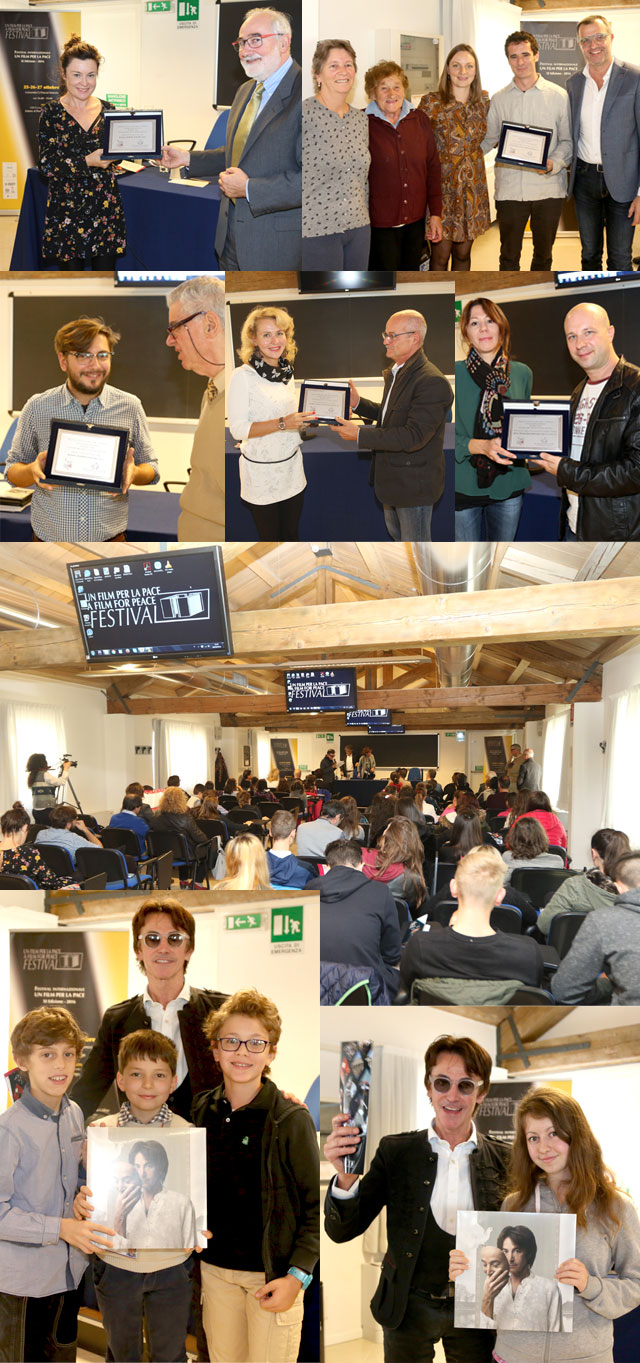
The International Festival A Film for Peace aims at promoting films addressing the issues of peace and human rights. Thanks to the circuit of schools and partner universities, such as the University of Udine, University of Padua- Law School, University Ca’ Foscari Venice - Department of Philosophy and Cultural Heritage, the Festival was able to present the films in competition to new generations of students; this year 93 films were competing of which 24 were selected for screening.
We are happy to announce that we were able to establish this year the Festival’s archives at the Department of Philosophy and Cultural Heritage of the University Ca’ Foscari, Venice (scientific coordinator Prof. Fabio Perocco and Artistic Director Dr. Enrico Cammarata).
The Award Ceremony held on October 28, 2016 marked the end of the eleventh edition of the Festival. The event was held at the University of Udine, Gorizia Campus in the presence of producers, directors, University students and representatives of the teaching staff. The event was also attended by students from primary school of Medea and Isis Paschini-Linussio, Tolmezzo. Musician and songwriter Alberto Fortis and the music arranger Franco Frassinetti were the hosts of the Festival.
There were awarded the following prizes: the Award for the Best Anti-War Film was granted to the film “My Enemy-My Brother” by Ann Shin (Spain); the Award was handed out by the Festival’s Chairman, Carigo Gianluigi Chiozza to producer Melanie Horkan; Special Award for Best Animated Film Recommended for Children went to “dRraw not War-Sunday Bloody Sunday“ (Italy, Israel, Palestine) and was handed out by Councilor for Education for the Province of Gorizia, Ilaria Cecot to director Matteo Valenti; Special Award for the Best Film on the First World War was granted to the film “Figli di Maria” (Italy) and was handed out to director Cristian Natoli by Prof. Fulvio Salimbeni from the University of Udine; Special Award for Best Film on Water Rights was granted to the film “I custodi dell’acqua-La Carnia si ribella” (Italy) and was handed out by the mayor of the Municipality of Medea, Igor Godeas to director Giulio Squarci; Special Award for the Best Film on Disarmament was awarded to the film “The Plague-The Reich Chronicle” by Maxim Kuznetsov (Russia) and was handed out by the Chairman of the Festival A Film for Peace, Alberto Bergamin, to producer Alevtina Gubacheva.
Present to the Award Ceremony were also the following partners of the Festival: Dr. Gianluigi Chiozza, Chairman of the Foundation Carigo, Prof. Nicoletta Vasta and Prof. Marco Rossitti, representatives of the Rector of the University of Udine, and finally, Prof. Fulvio Salimbeni from the same University, who held a lecture on the First World War before the event.
The Special Award for the Best Film Recommended for Schools was granted to the film “La mia casa e i miei coinquilini (My House and My Roommates)” by Marcella Piccinini (Angola, Italy and Turkey) and the award for Best Film on Human Migration to the film “District Zero” by Pablo Iraburu, Jorge Fernández Mayoral & Pablo Tosco (Spain). Review of the Awards.
The artistic direction has also granted eight Special Mentions to the films listed below for having addressed important issues regarding human rights and the right to peace: “The Killing Order” by Bo Wang (China), “La sedia di cartone (The Cardboard Chair)” by Marco Zuin (Italy), “Le Maroc: incrocio di culture e religioni (Morocco, Crossroads of Cultures and Religions)” by Lia Giovanazzi (Italy in coproduction with Morocco), “Generation Hope” by Mary’s Meals (United Kingdom in coproduction with the United States of America, India, Haiti and Malawi), “Captivity” by Evgeny Michkov (Russia), “Lesson Unlearned 14\41” by Nina Vedmitskaya (Russia), “La verdad bajo la tierra Guatemala, El genocidio silenciado” by Eva Vilamala (Spain), “01:05:12. The Longest Race” by Javier Triana and Rubén San Bruno (Spain). Review of Special Mentions.
The Organization of the Festival wishes to thank all producers and directors who participated to this year’s Festival and to all our partners who made possible to hold its eleventh edition.
September 21, 2015: Special Event at the Venice Biennale
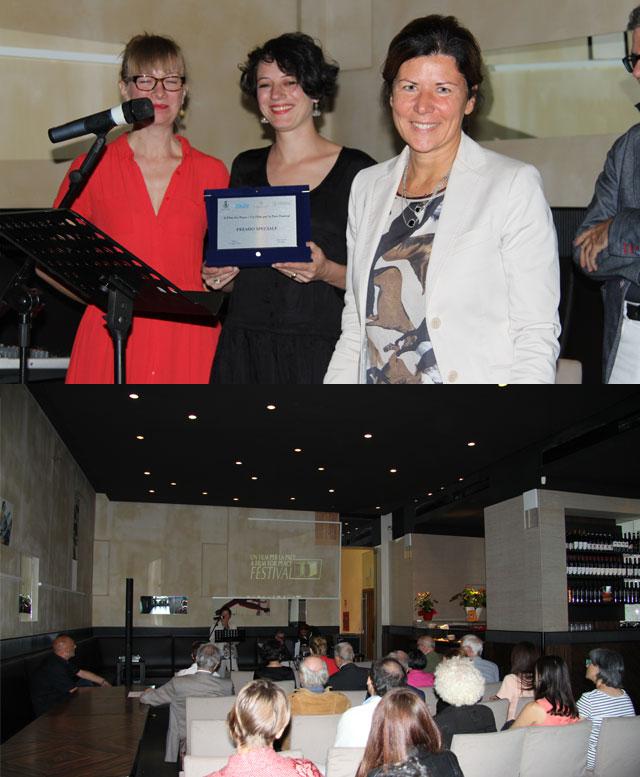
Venice Biennale has organised a meeting at its Ca' Giustinian headquarters for the presentation of Enrico Cammarata's book "Born to Die" (published by Il Mulino). The book presents the First World War using a multidisciplinary approach including history, philosophy, art, human rights and literature.
Besides Enrico Cammarata, the event was attended by two of the authors who collaborated to the writing of the book: Giuseppe Goisis professor of Political Philosophy at Ca' Foscari University of Venice and Prof. Giorgia Zanon, professor of Human Rights and Public Ethics at the University of Padua.
In addition, were screen two video art also on the subject of the First World War: "This Way Die Stars" and "Trench"; the soundtrack was performed live by Enrico Cammarata (vocals) and Joe Pisto (guitar). With this occasion, it was also screened the film "Totems" by French director Sarah Arnold: a short fiction film dedicated to the memory of the victims of the Great War. The director, accompanied by producer Helen Olive were handed the special prize "From World War I to the Future of Peace" granted by A Film for Peace Festival, edition 2015.
Thus, the public present assisted to a conference-show that has dealt with various aspects of one of the biggest tragedies in the human history.
September 3-8, 2015: the Festival "A Film for Peace" at the Venice Film Market
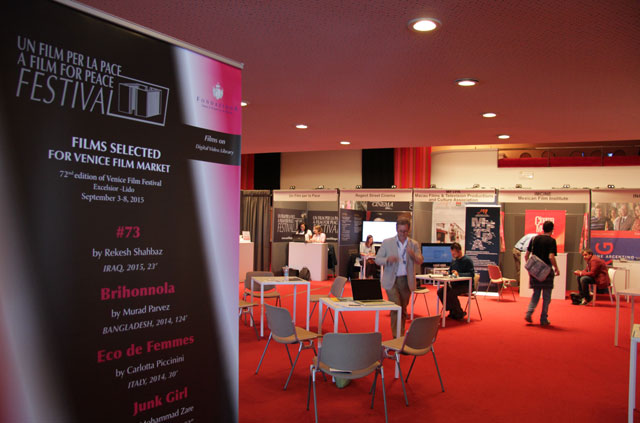
From September 3 to 8, 2015 A Film for the Peace Festival was present at the Venice Film Market of the 72nd Venice International Film Festival with 7 films in competition and 1 out of competition. It was not an easy job to choose only a few works to be presented during the Festival, but we had to limit our choice to only a small number. During the event, the Festival's staff had the opportunity to contact and meet different operators in the world of cinema in order to promote the 8 movies. We had available a stand, which was set up for this occasion in the space reserved for Venice Film Festival, stand which was used for promotion activities. The operators had the possibility to watch all films through digital stations. Through this event, the Festival has been able to promote the films in competition also in the film market giving thus the authors and producers another opportunity to have their works seen and sold. Our job was to contact prospective buyers, which in case of interest, will directly contact our film producers. We what to use this opportunity to thank the authors and producers of the participating films for their collaboration and to wish them all the success they deserve.
July 12, 2015: Awards Ceremony at Ara Pacis Mundi Monument
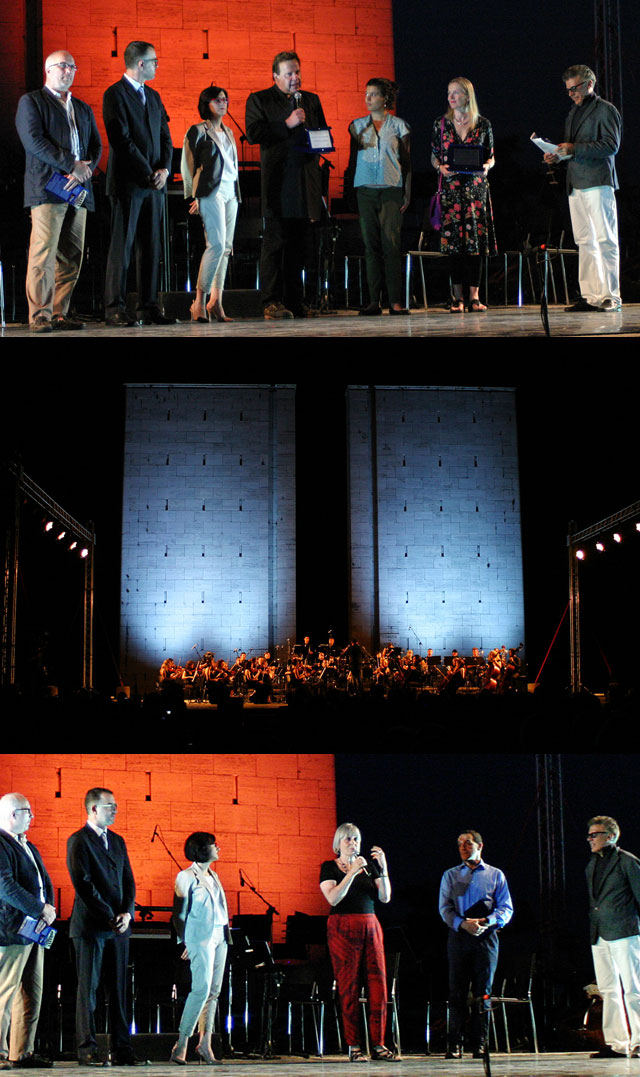
The ceremony was held at the national monument Ara Pacis Mundi of Medea (GO) and was attended by a large audience coming from all over Friuli Venezia Giulia region.
Several juries made up of students from Italian schools and universities have participated in the screenings and collaborated in the selection of films. The following schools and universities were included: Primary School of Medea, Zanella Lower Secondary School of Padua, Petrarca High School of Trieste, the Department of Political Philosophy of Ca Foscari University of Venice, and the Department of Contemporary History, University of Udine.
The Festival has granted in total 13 Awards and 6 Special Mentions.
The technical jury composed of Enrico Cammarata (Artistic Director of A Film for Peace Festival and President of the Jury), Marco Silvestri (Journalist) and Patrizia Della Vedova (Director of Photography) has ranked the 4 film finalists selected by the jury made up of students from Italian schools of all levels partners with the Festival and has assigned the awards according to regulations.
The Second Prize for Best Short Film was awarded to Iraqi director Rekesh Shahbaz for the film “#73”. Review of the Award: through the words of members of a Kurdish community besieged and persecuted by ISIS fighters, the documentary narrates a very actual and cruel story. The Award was granted for the simplicity and objectivity with which the human drama of Yazidi Kurds is presented.
The First Prize in the same section of shorts was granted to the film “A Heart That Never Dies” by Tom Heinemann and Erling Borgen. Review of the Award: The Dano-Norwegian documentary brings before our eyes the conflicts and social problems that plague Bangladeshi people for decades, poverty, natural disasters and bloody armed clashes. The film ranked first and was granted the Award for Best Short Film for the way the theme of human rights has been addressed and for picture and direction quality. Mrs. Silvia Altran, Mayor of Monfalcone, handed out the Award to the Norwegian director Erling Borgen and to Agnete Haaland, who represented director Tom Heinemann.
In the feature films section, the runner up was the film “Brihonnola” by Bangladeshi director Murad Parvez. Review of the Award: the story of everyday harmonious coexistence between two religious communities, Hindu and Muslim, was narrated through a drama which benefited from remarkable production and direction and highly talented actors. “Kevin - Will My People Find Peace?” by Italian directors Elisa Mereghetti and Marco Mensa ranked first in the feature films section. Review of the Award: the Italian documentary is a journey into a country, Uganda, torn by conflicts and human rights abuses such as the abduction of children which are recruited and forced to fight in wars. The documentary received the Award for Best Feature Film in recognition of the ability of directors Elisa Mereghetti and Marco Mensa to treat the issue of human rights in Uganda with simplicity and clarity, which are essential characteristics for effective communication and information of citizens. The Award was handed out to the directors by Federico Portelli, Councillor for Culture, Province of Gorizia.
“A Heart that Never Dies” by Tom Heinemann and Erling Borgen was the Absolute Winner of A Film for Peace 2015 Edition. Review of the Award: The documentary captures the difficulty of recognition and implementation of human rights in Bangladesh. This high quality documentary discussing the subject of human rights best represents the Festival’s purpose, which is focusing on recognizing high quality films on human rights. The Award was handed out to the Norwegian director Erling Borgen and to Agnete Haaland, who represented director Tom Heinemann, by Sara Vito, Councillor for Environment, Autonomous Region of Friuli Venezia Giulia.
Special Awards: Special Award for Best Film “Acqua Bene di Tutti (Water Rights)” was awarded to the film “It Hit Upon the Roof” by Teymour Ghaderi, 2015 (IRAN); the Special Award Best Short Film Recommended for Schools” went ex-aequo to the films “Ailia” by Sameh Salem, 2015 (UNITED ARAB EMIRATES) and “The March for Freedom ‘1963’”by Davon Johnson, 2015 (USA); Special Award Best Feature Film Recommended for Schools was granted to film “A luta continua (The Struggle Continues)” by Raul De La Fuente, 2015 (SPAIN); the Special Prize for the Best Film on Disarmament was awarded to the film “Impression-xps160” by Tiyam Yabandeh, 2013 (IRAN); Special Award for Best Animated Film Recommended for Children of Primary Schools was granted ex-aequo to the films “Junk Girl” by Mohammad Zare, 2014 (IRAN) and “Akdenizli” by Yiğit Pehlivan, 2014 (TURKEY); finally, the Special Award “Dalla Prima Guerra Mondiale al Futuro di Pace (From the First World War to a Future of Peace)” to the film “Totems” by Sarah Arnold, 2014 (France).
Special Mentions: “10949 Femmes” by Guessoum Maximum, 2014 (ALGERIA in co-production with FRANCE);”A Breath of Life” by Snjezana Brezo, 2013 (BOSNIA AND HERZEGOVINA); “Ants Apartment” by Tofigh Amani, 2014 (IRAQ); “Eco de Femmes“ by Carlotta Piccinini, 2014 (ITALY); “This Is Not Paradise” by Lisa Tormena, 2014 (ITALY); and “Victory Day” by Alina Rudnitskaya, 2014 (RUSSIA).
In parallel with the Festival were conducted study seminars on cinema and human rights which were held at the University of Padua and Ca’ Foscari-Venice.
New for 2015 will be the participation of A Film for Peace Festival with seven films at the Venice Film Market held during the 72nd Venice International Film Festival. In addition to rewarding the films, the goal of the Festival is to provide broader marketing opportunities in the global market to producers of engaging, quality films competing in the current edition of the Festival.
October 31, 2014: Presenting the Finalists at the University of Trieste, Gorizia Campus
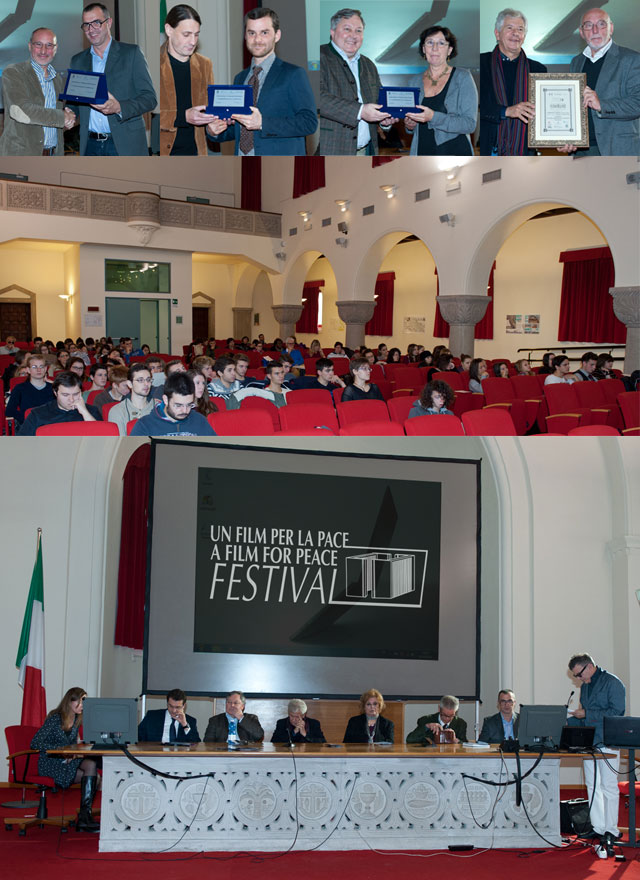
The ceremony was held in the Aula Magna of the University of Trieste, Gorizia Campus and was attended by students of graduate and undergraduate programs. The Award Ceremony was preceded by a Conference on Human Rights, having as speakers Prof. Piergiorgio Gabassi, Prof. Georg Meyr, Prof. Fabio Spitaleri, Prof. Fulvio Salimbeni and Dr. Marina Rossi.
The Festival has granted in total 11 Awards and 8 Special Mentions.
The technical jury, composed of Marco Silvestri (journalist and President of the Jury), Alessandro Simonetto (musician) and Enrico Cammarata (Artistic Director of the Festival “A Film for Peace”) has ranked the 4 film finalists selected by the jury made up of students from Italian schools of all levels partners with the Festival, and has assigned the awards according to regulations. The Second Prize for Best Short Film was awarded to the American director Max Weissberg for the film “Karaganda”. Outline: “The narrative film Karaganda, by Max Weissberg tells the story of a Soviet Union prisoner in the fifties, through which it exposes the cruelty of Stalin’s prisons and the wickedness with which the guards treat the prisoners, and the prisoners, in turn, other prisoners”. The film director was awarded the prize for remarkable direction, which empowered the actors to successfully transmit the human drama of prison experience. The President of the Technical Jury, Marco Silvestri handed out the award to the American director Max Weissberg, during the event organized at the University. The First Prize in the same section of shorts was granted to the film “Costruire amor: educazione e lavoro per il cambiamento/ Building Love - Education and Work for the Change”, by Luca Trovellesi Cesana. Outline: “The short by Luca Trovellesi Cesana documents through images and the voices of young Ethiopian women their willingness to study and learn a profession and their hopes of overcoming their social and family condition of extreme poverty. An insightful document for the promotion of the human right to education, which should be recognized and granted to all human beings of every social condition”. The award was handed out by the Mayor of Medea Igor Godeas to the Italian director Luca Trovellesi Cesana, during the event organized at the University. In the feature films section, the runner up was the film “Notre Cri du Coeur: le donne e il conflitto in Casamance/ Our Heart Cry: Women and Casamance Conflict” by Paola Montecorboli. Outline: “Cinema and television have presented and are still presenting to us many documentaries on Africa. This award-winning feature film, stands out for bringing before us the suffering of a people fighting for their freedom. The drama has even greater impact when those suffering are women subjected to violence by men. We give credit to director Paola Montecorboli for her commitment to promote urgent issues such as the right of peoples to self-determination”. The award was presented by Prof. Georg Meyr, Coordinator of undergraduate and graduate courses in “International and Diplomatic Sciences”, Department of Social and Political Sciences of the University of Trieste, Gorizia Campus. Ranked first in the feature films section and Absolute Winner of the edition A Film for Peace 2014 was the film “Haytarma”, by the Ukrainian director Achtem Seytablaev. Outline: “The narrative film “Haytarma” by Achtem Seytablaev recounts a tragedy, the deportation of the Tatars of Crimea in the Soviet Union on May 18, 1944. The film reconstructs the suffering of women, children and the elderly undergoing the forced deportation from their homes and the threat of losing their sense of identity. The film was rewarded for the outstanding staging of painful events, which are remote and so difficult to capture”.
During the ceremony was also granted the Special Award for Best Film “From the First World War to a Future of Peace” for the film “L’Albero tra le Trincee/ The Tree between the Trenches”, screenplay by Paolo Rumiz and direction by Alessandro Scillitani. Outline: “The documentary takes us to sites bearing witness to the tragedy of First World War in a journey from Trieste to Stelvio, from Pasubio to Pal Piccolo, from Ortigara to Grappa. The prize was granted for having represented the great human drama of the First World War, not through the traditional thematic documentary, but through a narrative documentary which brought before us the human soul”. The award was handed out to the scriptwriter Paul Rumiz by Prof. Piergiorgio Gabassi, Director of the Department of Social and Political Sciences at the University of Trieste.
Special Awards: Special Award for Best Film on the right to water “Acqua Bene di Tutti/ Water Rights” was awarded ex-aequo to film “Costruire amore - Farfalla che porta acqua e speranza/ Building love - Butterfly that Carries Water and Hope” by Luca Trovellesi Cesana and “ll Padre/ The Father” by Riccardo Banfi; the Special Award Best Short Film Recommended for Schools” went to “Costruire amore - Educazione e lavoro per il cambiamento/ Building love - Education and Work for the Change” by Luca Trovellesi Cesana, the Special Award Best Feature Film Recommended for Schools was granted for the film “Haytarma” by Achtem Seytablaev; the Special Prize for the Best Film on Disarmament was awarded ex-aequo to the film “Tears” by Iranian director Yahya Ghobadi and “Gernika” by Spanish director Angel Sandimas; Special Award for Best Animated Film Recommended for Children of Primary Schools was granted to the film “Big Bang” by Russian filmmakers Tatiana Moshkova and Nini Kavtaradze; finally, the Special Award Dalla Prima Guerra Mondiale al Futuro di Pace/ “From the First World War to a Future of Peace” to the film “L’Albero tra le Trincee/The Tree between the Trenches” by Alessandro Scillitani.
Special Mentions: to the film “Dreaming On: “The Story of the Quandamooka People” by Marcia Machado, to the film “Bellezza o monnezza?/ Beauty or trash?”, by Giampiero Monaca and Lina Prinzivalli, to the film “Son of Man” by Janek Ambros, to the film “Seeds of Hope” by Fiona Lloyd-Davies, to the film “Too Many Ghosts” by Ian Woodward, to the film “Beyond the Divide” by Jan Selby, to the movie “I Loved You So Much” by Orhan Tekeoglu, and to the film “Elhallgatott gyalázat/Silenced Shame” by Fruzsina Skrabski.
The event of Gorizia represented the completion of a process that began in November 2014 with the publication of the competition notice and went through the selection by the artistic jury and the jury of schools partners with the festival. In parallel with the Festival were conducted study seminars on cinema and human rights that were held at the University of Trieste, Udine, Padova and Ca’ Foscari-Venice.
New for the 2014 edition, was a special event sponsored by the festival A Film for Peace during the 71st Venice International Film Festival. For next edition, the Festival intends to strengthen its presence in this area by providing further marketing opportunities to engaging and quality films.
September 3, 2014: “A Film for Peace” Festival, Venice
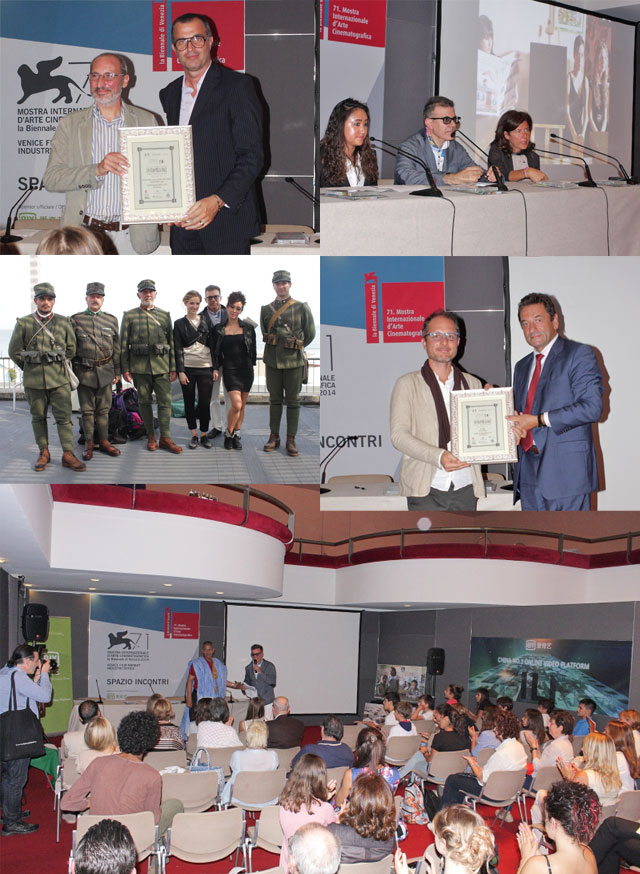
On 3rd day of September of this year, “Human Rights and A Film for Peace” Conference was held at Excelsior-Spazio Incontri (see Program) as part of the 71st Venice International Film Festival.
The event, sponsored by the University of Padua, School of Law had as speakers Prof. Giorgia Zanon (University of Padova), Prof. Giuseppe Goisis (University Ca’Foscari, Venice), and Prof. Fulvio Salimbeni (University of Udine).
The Conference was attended by a large audience, both from Italy and abroad.
During the event was highlighted the relation between cinema and peace, by recalling the First World War on its centennial anniversary. In addition, it was screened in world premiere the video art “This Way Die Stars” (Stars Die This Way) by Enrico Cammarata, which emphasized the absurdity of war and of certain daily actions using First World War footage. The video art was named after the song which is the sound-track of the film.
During the event, Mohamed Abdallahi Salem, Representative of Sahrawi Arab Democratic Republic presented the drama of the Saharawi people.
Finally, the Special Award for Best Film on the right to water “Acqua Bene di Tutti/ Water Rights" granted at the festival “A Film for Peace” by juries made up of students from Italian schools of all levels was handed out. The Festival aims to promote films dealing with issues related to human rights, peace and justice.
This year the Award, granted ex-aequo, went to the movies “Il Padre/ The Father”, by Riccardo Banfi and “Costruire Amore -Farfalla che porta acqua e speranza/ Building Love - Butterfly That Carries Water and Hope” by Luca Trovellesi Cesana. The Awards were handed out respectively by Eddi Gomboso, the Sole Director of Cafc S.p.a. (partner of the festival “A Film for Peace”) and by Igor Godeas, Mayor of Medea (partner and co-organizer of the Festival “A Film for Peace”).
June 6 and 7: Meeting the Directors and the Award Ceremony
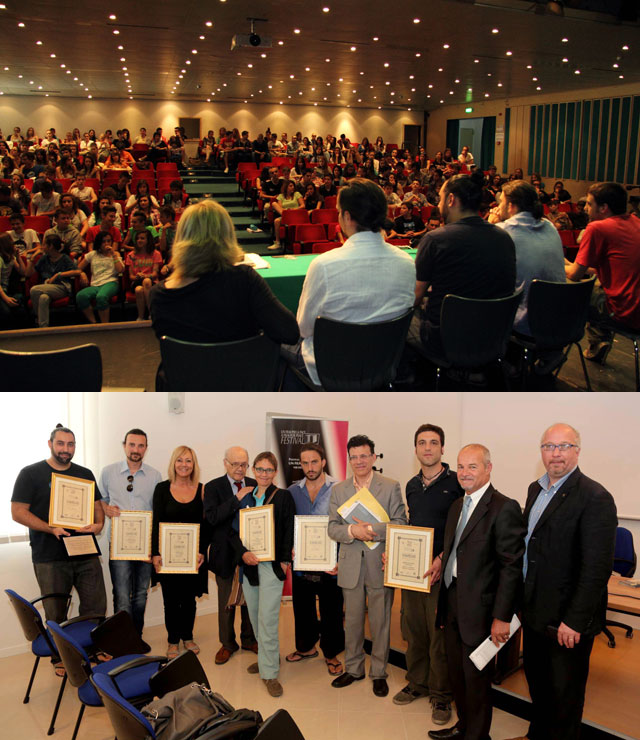
The eighth edition of the Festival “A Film for Peace” has assigned a total of 18 Awards.
The 4 finalists are: the Israeli film “One Day After Peace”, by the directors Erez Laufer and Miri Laufer who won the First Prize in the Feature Film category; the Second Prize went to the Italian film “Oltre il filo”, by the director Dorino Minigutti. The film “Ágape, Historia de un Sueño”, by the Spanish director Carlos Quiles came in second place as a short, while the First Prize was awarded to the film “La Mirada Perdida”, by the Argentinean film director Damián Dionisio who was also the Absolute Winner of the 2013 edition of the Festival “A Film for Peace”.
4 Special Awards: the Special Award for Best Film “Acqua Bene di Tutti/ Water Rights went to the Austrian film “Still Water”, by directors Johannes Gierlinger, Philipp Kleiben, and Markus Ochs, the Special Award Best Short Film Recommended for Schools” went to Damiano-Al di là delle Nuvole iniziano i Sogni”, by the Italian director Giovanni Virgilio, the Special Prize Best Feature Film Recommended for Schools was awarded to the film “Kosovo versus Kosovo”, by the Italian director Andrea Legni. The Special Prize for the best Film on Disarmament was awarded to the film “Second Wind”, by the Russian director Sergey Tsyss, and the Special Prize for the Best Film “From World War I to the Future of Peace” went to the film “La Frontiera”, by the Italian director Franco Giraldi
8 Special Mentions: awarded to the film “Home”, by the Australian director Jessica Harris, to the film “Weisst du, Was Ich mir Wünsche?”, by the German director Irina Arms, to the film “More Than Two Hours”, by Iranian director Ali Asgari, to the film “Le Croci di Malta”, by the Italian director Gilberto Mastromatteo, to the film “Memorial”, by the Italian director Francesco Filippi, to the film “Saharawi donna, dall’Esilio alla Repubblica”, by the director Fiorella Bendoni, to the film “The Tale of the Wall Habitants”, by the Serbian director Andrej Boka and to the film “The Red Carpet”, by the Spanish directors Manuel Fernández and Iosu López.
More than 600 students including university students and students from various secondary schools of the Friuli Venezia Giulia, Veneto and Trentino - Alto Adige participated at the screening event and judged the films in competition.
The climax of the Festival was on June 6 and 7 in the cities of Bolzano (Trentino-Alto Adige) and Gorizia (Friuli-Venezia Giulia).
In Bolzano, at the Roen Auditorium, the students of G. Carducci High School, of the Gymnasium W. der Vogelweide and of the Archimede Secondary School had the opportunity to meet with the filmmakers present and ask them questions about the award winning films and about the challenges of their work. The event was attended by three deans of the schools partners of the Festival 2013, Christian Tommasini, the Vice President of the Autonomous Province of Bolzano- south Tyrol and Patrizia Trincanato, Councilor for Culture of the Province of Bolzano. The delegation of Gorizia was comprised of the Councilor of Culture of the Province of Gorizia Federico Portelli and the Vice-Mayor of Medea Flavio Gallas. In the Roen Auditorium was organized a photo show with images of the films “Saharawi Donna/ Saharawi Woman” and “Migranti/Migrants”.
In Gorizia, at the Aula Magne of the University of Udine (Gorizia Campus in Via Santa Chiara) the following filmmakers have received the awards: Damián Dionisio, Carlos Quiles, Andrea Legni, Gilberto Mastromatteo, Fiorella Bendoni and Franco Giraldi. The award ceremony was preceded by a conference on the First World War which was followed by the photo exhibition “First World War: Images from Isontino”.
The writer Susanna Tamaro was the guest of the Festival and received the award on behalf of the director Giovanni Virgilio, who was absent from the Festival because he was working on his new film. The film Damiano - Al di là delle Nuvole/ Damiano - Beyond the Clouds was dedicated to the young actor Damiano Russo who was supposed to be the protagonist of the film but lost his life in a car accident. Tamaro, friend of the young actor who died prematurely, paid tribute to him by receiving the prize in his honor.
We have to mention among those present at the event in Gorizia, Alberto Bergamin, the Mayor of Medea and Coordinator of the Festival, Gianluigi Chiozza, the President of the Foundation Cassa di Risparmio of Gorizia, Federico Portelli, the Councilor of Culture of the Province of Gorizia, Fulvio Salimbeni professor of Contemporary History at the University of Udine and the scholar Marina Rossi. Enrico Cammarata, the Artistic Director of the Festival has presided over the events of Bolzano and Gorizia.
The next activities of the Festival are scheduled on September 21 and the last week of October, and are respectively dedicated to peace and disarmament and are the final stages that will close this year’s edition.
March 22, 2013: the first event of the eight edition of the Festival "A Film for Peace" held in two Italian regions

The first 2013 event of the eighth edition of the Festival "A Film for Peace" was held in Friuli-Venezia Giulia and Trentino-Alto Adige on March 22 - day set apart by the UN as World Water Day, (see brochure).
Every year, the winner of the Special Award "Water Rights" is screened on March 22. This year, the award was grated to the Austrian film “Still Water”- directors Johannes Gierlinger, Philipp Kleiben and Markus Ochs. The documentary presents the Turkish citadel of Hasankeyf, rich in archaeological sites and art. In 2014, the government will build a large dam for the production of electricity, which means that the ancient town will be buried forever under the water. The people have already started to leave their own homes to move in houses without electricity and without water, granted by the state. Hasankeyf is a symbol of the huge cultural, ecological, and social loss that the humanity will suffer because of the shortsighted choices made by the Turkish government, choices that will bring a small economic benefit that will last only 50 years.
The event was held at Aula Magna of Istituto Comprensivo Bolzano V-Gries 1 (Bolzano V-Gries 1 Institute) in Bolzano and was attended by the students of the primary school of the same Institute. Marina Degasperi, the School Director (Head Teacher), greeted the guests: Patrizia Trincanato - Culture Councillor of the Municipality of Bolzano, Martina Adami – School Director (Head Teacher) of the Gymnasium W. der Vogelweide of Bolzano, Andrea Pedevilla – School Director (Head Teacher) of Liceo Classico Linguistico G. Carducci/ G. Carducci Classic and Modern Languages High School) of Bolzano, Sergio Lapegna - Prevention Technician -Health Agency of South Tyrol, Ernesto Scarperi - Head Office Water Protection of the Autonomous Province of Bolzano, Enrico Cammarata - Artistic Director of the Festival "A Film for Peace".
In Romans d'Isonzo, Friuli-Venezia Giulia, the students of the junior secondary school of Istituto Comprensivo di Romans d’Isonzo Mariano del Friuli participated at the screening of the winner film, "Still Water". The screening was attended by Davide Furlan, the Mayor of Romans d'Isonzo, Paolo Buzzulini, the School Director of Istituto Comprensivo of Romans d’Isonzo Mariano del Friuli, and Alberto Bergamin, the Mayor of Medea and Coordinator of the Festival "A Film for Peace".
The event having as theme the right to water is the first of a series of events that will be scheduled during the eighth edition of the Festival and will present the films in competition to the students of universities and secondary schools of Friuli-Venezia Giulia, Veneto and Trentino-Alto Adige.
September 21, 2012: Cambridge University, the final stage of the seventh edition of the Festival “A Film for Peace”
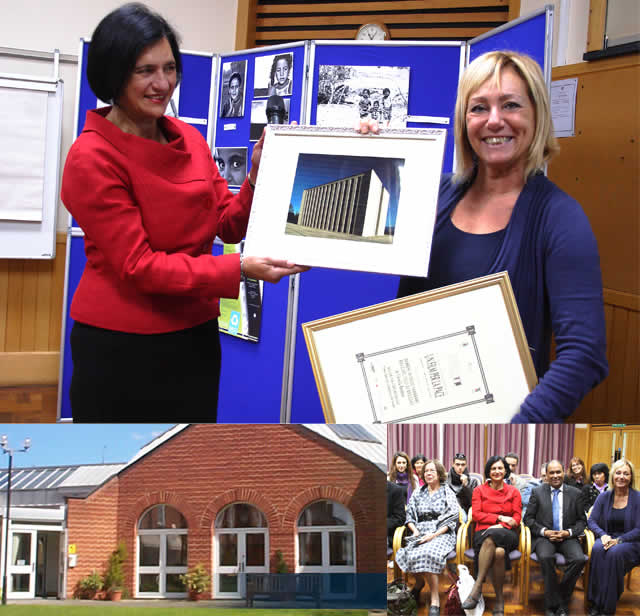
On September 21, 2012 the seventh edition of the Festival “A Film for Peace” ended with a special event held at the University of Cambridge (Hughes Hall college): University ranking first in the world according to the QS World University Rankings. The event was organized with the support of the Association “La Dante in Cambridge” and took place on the occasion of the International Day of Peace convened by the UN. The following award-winning films have been screened (as shown in the Program - PDF): “Life in Italy is OK” by Gianfranco Marino (absolute winner ex aequo 2012), “Pink Fluffy Bunnies” by Ava Lanche (absolute winner ex aequo 2012) , “Carbon for Water” by Evan Abramson and Carmen Elsa Lopez (winner of the special award “Water Rights”) and “Children in exile in Sahrawi, refugees, children of refugees” by Fiorella Bendoni (winner of the special award “Best Short Film Recommended for Schools “). This last film was introduced by journalist Gilberto Matromatteo, expert on the culture of the Sahrawi people. The award was handed to Director Fiorella Bendoni by Ms. Giulia Portuese-Williams, Director of the Association “La Dante in Cambridge”, our partner for the Festival.
Mr. Lamine Abbali, the representative of the Sahrawi Republic in London, participated at the event in Cambridge.
The people present at the event enjoyed the display of photos of the Sahrawi people by photographer and filmmaker Estefania de la Chica.
July 2nd and 3rd 2012: Meeting the Authors and the Award Ceremony
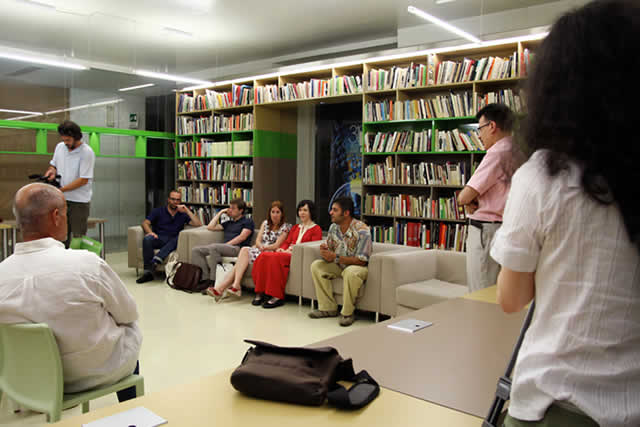
The events of July 2nd and 3rd were the epilogue of a journey which lasted from March to May and involved schools of Friuli Venezia Giulia, Sicily and Veneto.
The schools in which were viewed and judged the 66 films selected by the artistic direction of the seventh edition of the Festival “A Film for Peace” were respectively, for Friuli Venezia Giulia: Sello Art School, Udine, Pordenone Centro Middle School, Pascoli Middle School (Cormons), and University of Udine, Dams, Faculty of History of Cinema, for Sicily: Meli High School (Palermo), and for Veneto: Belli High School and XXV Aprile High School (Portogruaro).
In addition, on March 22nd, on the occasion of World Water Day convened by the UN, the students of Romans d’Isonzo Middle School have viewed the film “Carbon for Water”, which won the Special Award “Water Rights”.
On July 2nd, at Palazzo del Cinema, home of the University of Udine, School of Dams (GO), after the screening of the finalist films and of some of the winners of special prizes awarded in 2012 (as shown in the Program - PDF), the directors Alexei Dmitriev (Russia), Ava Lanche (Germany), Christian Canderan (Italy), and Gianfranco Marino (Italy) met with the public. The meeting was an important opportunity to hear the artists talking about particular situations and giving details on the realization of their films, details about which one could not have learned from the information commonly given during the festival.
The event was recorded by the crew of Canale Italia and was aired on July 4 on the national TV channel Canale Italia 84.
On July 3rd, at the National Monument “Ara Pacis Mundi” of Medea (GO) was held the award ceremony of the Festival “A Film for Peace”, 2012.
The artists who walked onto the stage to accept their awards were: Alexei Dmitriev, director of the film “Hermeneutics” (Russia), Ava Lanche, director of the film “Fluffy Pink Bunnies” (Germany), Christian Canderan, director of the film “Il sole tramonta a mezzanotte” (Italy), and Gianfranco Marino director of the film “Life Is Okay in Italy” (Italy).
The audience, about 3 000 people, assisted while the directors present at the ceremony received the following prizes: Absolute Award of the Festival “A Film for Peace”, 2012 edition, ex aequo, was awarded to the movie “Fluffy Pink Bunnies” (co-production Egypt - Tuvalu) by Ava Lanche and to the film “Life in Italy Is Okay” (Italian production) by Gianfranco Marino. The Award for Finalist Film was granted to the film “Il Sole tramonta a mezzanotte” by Christian Canderan (Italian production) and the Special Award for the “Best Film on Disarmament” to the film “Hermeneutics” (Russian production) by Alexei Dmitriev.
Special Prize for the Best Film “Water Rights”
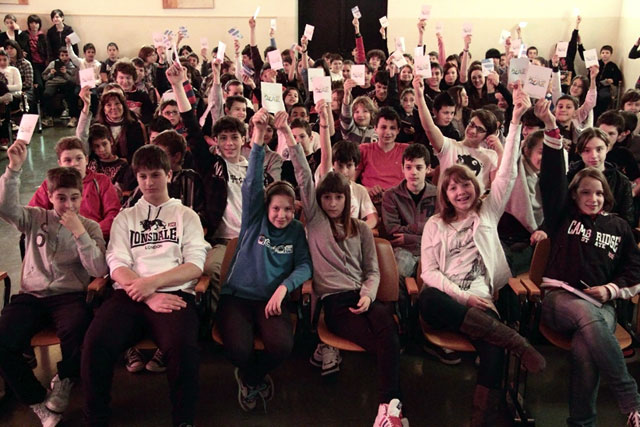
The Festival “A Film for Peace” grants for three years now, a Special Award called “Water Rights”, aiming to reward the films having as theme the right to water. The special section for Registration in Competition closes on February 28 of each year. The winning film is then screened as part of World Water Day organized by the UN on March 22.
This year’s celebration of the World Water Day was held at the Galupin Hall of Romans d’Isonzo (GO - Friuli Venezia Giulia - Italy) bringing together boys, aged 11 to 13 years, from the municipalities of Mariano del Friuli, Medea, Romans d’Isonzo and Villesse, all attending Istituto Comprensivo of Romans d’Isonzo, who in the presence of their teachers, the Mayor of Medea, Alberto Bergamin, the Mayor of Romans d’Isonzo Davide Furlan and the School Director Paolo Buzzulini watched the screening of the American film “Carbon For Water”, winner of the Special Award “Water Rights”, event that started the seventh edition of the Festival 2012.
Directors Evan Abramson and Carmen Elsa Lopez’s documentary, presented by the Artistic Director of the Festival, Enrico Cammarata, tells the story of the daily life of the children of a Kenyan village having to gather firewood in the forest to boil the unhealthy water taken from a river. After being boiled, the water is used for washing and preparing the food. Despite these precautions, cases of cholera are still reported. This is a story that should make us all reflect on the problem of water shortage affecting all continents.
The Festival’ Organizers would like to thank the authors who participated with their remarkable works to the section on Water Rights, topic that holds a special interest for the Festival since water shortage and its exploitation by humans concerns today the entire planet, both the poor and wealthy countries. The authors participating in this section of the Festival “A Film for Peace” allow the new generations, especially the middle school students, to get a glimpse into this new emergency, and thus promote more sustainable attitudes.
The screening and the Award Ceremony for the best film on the theme of disarmament at British Museum:
the final stage of the Festival “A Film for Peace” 2011
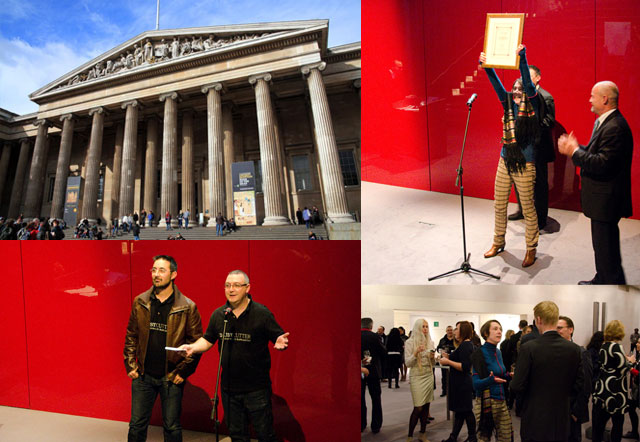
The International Festival “A Film for Peace” is very young - just six years old. Despite its young age, thanks to the passion and commitment of the municipality of Medea and the Windcloak Film Production, with the support of the province of Gorizia and of the Foundation Cassa di Risparmio of Gorizia, this event crossed the national frontiers and become in a short time one of the biggest festivals on human rights in the world, with 34 participating countries from all five continents. Based on the conception and design of the artistic director and anthropologist Enrico Cammarata, the festival has received the support and coordination of Alberto Bergamin, Mayor of Medea.
The great challenge of the Sixth Edition 2011 was to establish a special award for the topic of disarmament for which the screening and award ceremony was scheduled to take place at the prestigious British Museum in London. The event received the support of the regional councilor for productive activities of the Friuli Venezia Giulia-TurismoFVG. The award ceremony in London was organized in collaboration with Sagitter One and London Adv.
Thanks to the efforts of the Foundation Cassa di Risparmio of Gorizia, who has always showed sensitivity to the culture of the Friuli Venezia Giulia, the event was held on October 27, in the biggest temple of the world’s culture: the British Museum.
The program opened with the screening of a videoart lasting two minutes. The short film produced by the festival showed a girl striving to draw a symbol of disarmament and peace. With an unexpected gesture, the protagonist covered the soldiers (war vehicle) with a sheet of paper containing the drawing of the symbol of disarmament that she has just created. The message is one of optimism, the hope that maybe, one day, the reasoning and the best part of humanity will erase the war forever. This short videoart was followed by the greetings of the Coordinator of the festival, Alberto Bergamin, the Mayor of Medea, and the presentation of some of the cities and of the typical products of Friuli Venezia Giulia the region, products that the public could enjoy after the festival.
The day continued with an interesting report on disarmament by Dr. Marco Roscini, Reader in International Law, University of Westminster. Enrico Cammarata followed up with a speech about the festival and the cinema from an anthropological point of view.
After the screening of the film “Daisy Cutter” by Spanish directors Enrique Garcìa and Rubén Salazar, which received the Absolute Award at the festival of Medea on July 4, it was screened the winner of the Special Award for the Best Film on disarmament, entitled “Wardisease” by French director Marie Magescas, who received from Alberto Bergamin a framed scroll (parchment). The French director received also a photographic work in black and white printed on baryta paper on the issue of disarmament, signed by Bon & Cammarata, who have also exhibited a series of photographs in black and white (on baryta paper) on the topic of human rights in the foyer of Stevenson Theatre Hall of British Museum.
“Daisy Cutter” is an animation film that shows the destructive power of the Blue-82 bomb: the most destructive conventional bomb with its 7000 pounds of explosives.
The documentary “Wardisease” belongs to the genre of film editing and shows in just eight minutes the horror of war. They are images that help us reflect upon the human condition, which was capable of great things such as inventions, scientific discoveries, solidarity, but also of terrible things such as genocide, and violence beyond comprehension. Love and hate: two characters of human nature and the pillars of the psyche as defined by Sigmund Freud.
After the London experience, the 2012 edition of the festival will present other original works of interest, which will promote the collaboration between Italian and foreign universities in order to introduce to the new generations important issues leading to the building of peace between nations.
Medea 2011 Awards
On July 1 at the Palazzo del Cinema in Gorizia took place the public screening of the finalist films and of the two movies that received special awards. The screenings took place simultaneously in three different halls: two halls at the University and one hall at the Kinemax. There were present the following authors:
- Enrique Garcia and Ruben Salazar for the movie “Daisy Cutter”
- Fabrizio Lazzaretti for the film “Domani torno a casa”- i.e. “I come home tomorrow”.
- Katia Bernardi for the film “Auschwitz is my Teacher”
- Emanuela Gasbarroni for the film “Acqua e pace” – i.e. “Water and Peace”
The directors were able to meet the public and present their works.
On July 3, at the Ara Pacis Mundi National Monument of Medea (Gorizia, Italy) took place the award ceremony. The authors present at the ceremony had the satisfaction of seeing an audience of about 2000 people attending the event. The institutional world authorities that were present included: Friuli’s Regional Councilor for Culture Venezia Giulia Elio De Anna, the President of the Province of Gorizia Gerghetta Henry, Gorizia’s Provincial Councilor for Culture Federico Portelli, the Prefect of Gorizia Maria Augusta Marrosu, and other prominent names from the institutional and cultural world. The Mayor of Medea, Alberto Bergamin, the Coordinator of the Festival, led the event by explaining the stages and the goals of the Festival.
The Festival will continue, but this time outside our peninsula, with a last date scheduled for the 2011 edition. This special event, which will be held in London on October 27 at the British Museum, when the absolute winner of 2011, and the winning film on Disarmament (the title will be announced soon) will be screened, is an important opportunity for the Festival and for our authors to receive an international exposure, enjoying the presence of audiovisual producers, journalists and prominent businessmen.
The waiting is long! In the meantime, we wish all our authors, producers and distributors happy vacations!
Films “ADMITTED” and films “SELECTED” to the 2011 edition
The artistic direction takes the opportunity to thank all the authors and producers who participated in the Sixth Edition of 2011. The number of participating countries has increased from 26 to 34 and the quality of films reviewed was even higher. Of 141 films admitted, 55 films were selected and have been examined by 5 juries in order to grant the 9 awards: a special jury granted the special award “Water Rights” for the best film on this subject, a special jury granted the special award for the best film on “Disarmament”; a circuit jury granted the special award for “The Best Story Film” (member municipalities: Aquileia, Cormons, Pordenone, Udine), the circuit jury for colleges and Dams University granted the two awards for the best films “Recommended for Schools”, in addition to the evaluation of the selected films (the schools participating in the circuit: Gorizia -Alighieri High School and Iti Galilei High School, Udine - Percoto High School and Uccellis High School, Trieste - Petrarca High School, and the students of Dams University, Gorizia) and finally, the technical jury for ranking the 4 finalists.
Beginning this year the meetings of the juries were not open to the public in order for the jurors to do the best of jobs. Compared to 2010, this year the admitted films have not been evaluated by the public directly. Only the selected films were evaluated by a smaller popular jury. It should be noted that the synopsis of all the admitted films can be found in the catalog, as required by the regulations.
On July 1, in the auditorium of the University of Udine (Dams, Gorizia) and in the Kinemax hall will be screened to the public the four finalists; after the viewing the public will have the opportunity to meet the directors and the authors of these films.
All prizes will be presented on July 3 during the award ceremony attended by thousands of people every year.
Only the prize for disarmament will be presented at the British Museum in London on October 27.
Water- Common Good for All
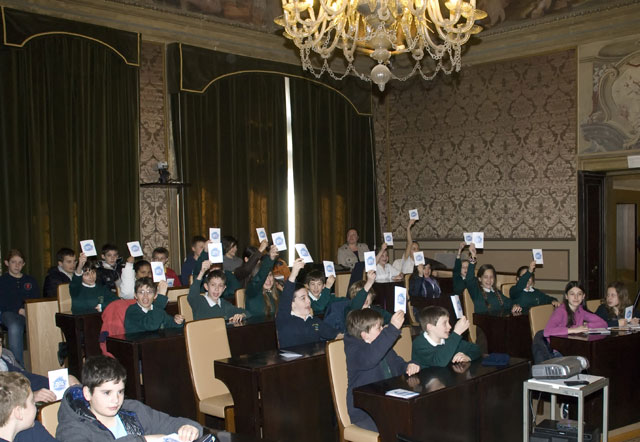
On March 22, 2011, with the occasion of the “World Water Day” began the VI International Festival “A Film For Peace” with the screening of the film “Water and Peace” the winner of the special prize for “Best Film – Water Rights“.
The event was held at the CISM (International Centre for Mechanical Sciences) in Udine. The audience, including students of The Mills English School and of Uccellis in Udine, was able to attend the screening of the documentary produced by director Emanuela Gasbarroni. The documentary deals with the issue of water rights, focusing on the armed conflicts between states caused by the scarcity of water resources. The film was highly appreciated by the schoolchildren; they had the advantage of a clear and simple, but all-encompassing exposition on the shortage of the ‘blue gold’ as the water is called today.
The meeting was attended by the president of the CAFC Udine, Eddi Gomboso, who outlined the aims and activities of the managing body of water that are designed to protect this increasingly valuable asset, and Eng. Moro, also of CAFC Udine, who answered questions from curious children and those interested in the subject.
The artistic director of the Festival, Enrico Cammarata, in initiating the sixth edition of the cine- competition, focused on the phases and changes made in the new edition. It was also shown the photographic work of the authors Bon & Cammarata, in black and white, hand-printed on fiber base paper, and having as subject the water rights, which will be delivered, together with the parchment, to the director Emanuela Gasbarroni during the award ceremony of Ara Pacis Mundi in Medea (GO).
The Award Ceremony
Due to organisational purposes, the award ceremony for the 5th Edition 2010 International Festival “A Film For Peace” was held on Sunday, September 5th, rather than during the second half of August, which was the initial plan.
The ceremony took place in Medea and was preceded by a ceremony of putting clods of earth from Nasiriyah and Herat in the hypogeum of the Ara Pacis Mundi monument, and was followed by the Concert for World Peace. A large, engaged audience attended the event, which was supported by regional, provincial and municipal governments. The mayor of Medea, Bergamin, read the message of appreciation for the event on behalf of Italy’s president, Giorgio Napolitano.
The Ara Pacis Mundi is an altar that stands for peace; it contains clods of earth inside of it and symbolically, it collects memories of those who died or went missing from various wars, coming from all nations, races and faiths, to express the defeat of war through the great hope of people from all over the world who believe in peaceful conflict resolution. By putting the clods of earth into the hypogeum, those who died in Iraq and Afghanistan while striving for the mission of peace were greatly honoured. Clods of earth were brought from Nasiriyah by the Medea police officer, Roberto Ramazzotti, who was wounded in the tragic attack, and another police officer, Marco Sellan, brought clods of earth from Herat on his way back from a mission in Afghanistan.
The 1st Place winner of the 2010 A Film For Peace Award was the American documentary, Agent Orange: 30 Years Later by John Trinh which also received 1st Place in the Feature Film Category. The director John Trinh collected the two awards.
The 1st Place Short Film award was given to the Iranian film Cold Blood by Amir Mehran. The director Amir Mehran wasn’t able to collect his award for bureaucratic reasons regarding entry into Italy.
The Runner-up Feature Film award winner was Strange Birds in Paradise - A West Papuan Story by Charlie Hill Smith. This Australian documentary also received the Best Educational Feature Film Award: Recommended for Schools. Producer John Cherry collected the awards.
The Runner-up Short Film was Berlino 1989-2009: 20 anni di libertà (Berlin 1989-2009: 20 Years of Freedom) by Dan Botbol. This Belgian film, produced by the European Commission, also received the Best Educational Film: Recommended for Schools award. Officer of the European Commission, Georges Papadakis, collected the awards. (ceremony photos)
The Concert for World Peace closed the event with a choir and orchestra performing Mozart’s Requiem, DKV 626 in D minor, performed by soloists Gisella Sanvitale, Silvia Bonesso, Francesco Cortese, Eugenio Leggiadri-Gallani, as well as by the choir “I madrigalisti di Trieste”, and the orchestra “I cameristi triestini”, conducted by Fabio Nossal.
That’s how the 5th Edition of the 2010 International Festival “A Film For Peace” ended, which has been a remarkable success this year with over 100 participating films, of which around 70 were admitted, and 15 of those were granted awards. The awards were assigned by 13 juries: 6 as part of the municipality network, 4 from the school network, 1 popular jury, 1 special jury for the “Water Rights” category, and last but not least, 1 technical jury.
The organisers of the Festival would like to give a heartfelt thanks to everyone that participated in the event. With their hard work, we’ve witnessed numerous issues concerning peace and armed conflict, human rights and world justice. All authors of the admitted films will receive a hard-copy of the catalogue.
The 2 Finalists In Each Category
Another tough challenge emerged between the 16 selected films for the 5th edition of the International Festival “A Film For Peace” 2010, this time for the 4 finalist rankings.
It definitely wasn’t easy for the jury to pick the 4 films that would be considered best among the 16 films.
It should be noted that the artistic direction was rigidly assessed during the selection process of the 16 films due to the high quality of these films.
The 4 finalist films are as follows:
Feature Films:
- Strange Birds in Paradise, A West Papuan Story by Charlie Hill Smith, AUSTRALIA
- Agent Orange: 30 Years Later by John Trinh, USA
Short Films:
- Berlino 1989-2009: 20 anni di libertà by Dan Botbol, BELGIUM
- Cold Blood by Amir Mehran, IRAN
Now, it is up to the technical jury to put together the list of films which will be granted the following awards: Best Film, First Place and Second Place Feature Films, and First Place and Second Place Short Films.
Over the next few days, the date of the award ceremony will be announced as the original date has been moved to the second half of August for organisational purposes.
The artistic director, organisers, and jury members would like to thank the authors and producers of all the admitted films and particularly those of the 4 finalist films for their works as they have brought us touching moments and have brought to our attention moving themes dealing with war and human rights.
In a few days, the film winners of the Audience Jury Award and the History of Cinema Award will be announced.
See you soon!
The Festival “A Film For Peace” To Date: Celebrating Its 5th Anniversary
The International Festival “A Film For Peace”, 5th Edition 2010, organised by the Province of Gorizia, the Town of Medea, Windcloak Film Production and the artistic direction of Enrico Cammarata, is now in its fifth year of celebration.
The 2006 1st Edition seems quite far from now as it only spanned nationally with 22 participating films.
The region of Sicily dominated the first two editions with a total of 13 participating films and the awarding of 1st Prize to the 2006 Sicilian film “Danilo Dolci, memoria e utopia” by Alberto Castiglione and the 2007 1st Prize to the film “Faccio finta di” by Nello La Marca and 3rd Prize to the film “La goccia” by Marco Lanzafame which are also Sicilian films.
The 2008 3rd Edition was the breakthrough of the event: the Festival spread to an international level with the participation of 39 films, 23 of these being foreign films.
Sicily lost its dominant position and led 4 participating films to Lazio. The 2008 Edition awarded the following prizes:
1st Place in the Short Film Section: “Smiling Dog” by Shohreh Jandaghian (Germany); 2nd Place: “Flowers of Rwanda” by David Muñoz (Spain); 1st Place in the Feature Film Section: “Il sogno di Peter” by Enrico Cerasuolo (Italy); 2nd Place: “Gli altri bambini” by Paola Chartroux (Italy). The final winner of the Festival “A Film For Peace” was announced as “Smiling Dog” by Shohreh Jandaghian (Germany).
The films admitted into the 2009 4th Edition included a total of 81 films, 24 of which were Italian films and 57 were foreign films. The Festival was sponsored in the same year by the European Commission Representation in Milan, the Italian National Commission for UNESCO, and the Autonomous Region of Friuli Venezia Giulia. In 2009, prizes were awarded to the following films: 1st Place in the Feature Film Section “Memories of a Generation” by Aaron Floresco, Canada; 2nd Place in the Feature Film Section “The Day After Peace” by Jeremy Gilley, (England); 1st Place in the Short Film Section The Italian Doctor by Esben Hansen (Denmark); 2nd Place “Una vida mejor” by Luis Fernandez Reneo (Spain); and the final winner of the edition was “The Italian Doctor” by Esben Hansen (Denmark). Also, the following special awards have been added: Special Award for SCHOOL NETWORKS to the best film “Memories of a Generation” by Aaron Floresco (Canada); Special Award for SCHOOL NETWORKS to the best short film “A Life of Death” by Dawn Westlake (U.S.A).
This leads us to the 2010 5th Edition. The Festival, with more than 100 participating films of which 74 films come from 26 countries from all 5 continents of the world, is among the most important thematic film festivals at the international level.
Foundation Cassa di Risparmio of Gorizia has been an official sponsor of the Festival for several years.
The 2010 Edition has also included immense participation of its partners, Cafc, l’Aato of Gorizia and Iris Acqua, which have contributed to the promotion of the Special “Water Rights” Award of the section that includes films focusing on water rights. On March 22, which is when World Water Day is celebrated, a jury granted a Special Award to the film “Le Acque di Chenini” by Elisa Mereghetti.
“Cafc spa”, emphasised President Eddi Gomboso, “also supports this initiative as a spotlight on water resources, coinciding with the celebration of World Water Day and dedicating a special award to this precious commodity. It is crucial to raise awareness that everyone has the right to water and therefore it should not be wasted. As a result, events that involve a large and mixed audience, such as the festival, end up being particularly important to recognise the value of this resource and promote a conscious use of it.
The 74 selected films will be screened in town networks, particularly in 6 auditoriums in the Towns of Aquileia, Cormons, Dignano, Medea, Romans d’Isonzo and Ruda from May 15 until June 18.
Among these admitted films, 16 films will be selected by 4 high schools, that are part of the School Network, to be evaluated.
On May 24, 25, 26, and 27, the 16 selected films will also be viewed and judged in the Sala della Torre of the Foundation Cassa di Risparmio of Gorizia by the Popular Jury, which consists of: a group of students from Dams University of Udine and a group of members from the Youth Forum of Gorizia.
The overall evaluation by the School Network and Popular Jury will allow for the appointment of 4 finalist films. These 4 films will be viewed and judged by the Technical Jury, which will then meet in July to decide the final ranking and assign the awards for the 2010 Edition.
At last, the awards ceremony will take place at the national monument “Ara Pacis Mundi” on July 19 at 20:30.